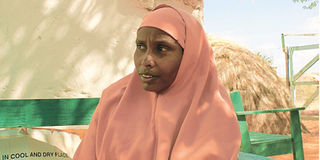How conflict led to neglect of TB clinic

Mrs Khadija Abdi tells of the TB clinic in Warjir town. PHOTO/DAVID NJAGI
What you need to know:
- Tuberculosis in pastoral communities is compounded by non-drug adherence and lack of specialised facilities.
To the ailing Wajir residents in Kenya who knew her, she was their guardian angel. But to the secret forces that were behind a controversial security operation that took place here in 1984, she was an unwelcome alien who needed to be removed.
Her removal came one day when she was distributing tents to widows whose husbands had been slain during the security operation which has come to be known as the Wagalla massacre of 1984.
She had been declared a persona non grata, and given 48 hours to leave the country, through Jomo Kenyatta International Airport which is 700 kilometers away from Wajir town, where she was expected to flee through on.
When all this was happening, Mrs Khadija Abdi was a young girl, but memories of the sorrow and tears that befell the town following Analena Tonneli’s extradition still linger in her mind.
TB manyatta
That sorrow is today reflected by the Wajir TB manyatta camp that the Italian missionary had helped set up to treat TB infections among the nomads in North Eastern Kenya.
Sitting on an isolated one acre piece of land outside Wajir Town, the compound where Analena was taking care of TB patients has been overgrown with bushes and acacia plants.
The isolation cubicles where each of the patients used to live have long fallen into disuse.
A rotor that used to steer a windmill to pump water from a borehole at the far end of the compound has crashed to the ground.
Inscribed on the concrete floor of the borehole is a date indicating that it was sunk sometimes in 1980, under the instructions of Analena, who was then a charity volunteer with a passion to care for TB patients.
To an occasional passerby, the compound would pass for an abandoned hamlet, although there are medical activities still going on at the dispensary.
Khadija, who now works at another TB facility across the road to care for ailing women is nostalgic about Analena.
“Analena used to take care of the poor people suffering from TB,” says Khadija.
“In the hard life of North Eastern Kenya, the disease is very widespread because people misuse drugs and do not complete the prescribed doses. Nutrition is also a problem because of persistent droughts.”
Therefore, says Khadija, Anelina came up with the idea of a TB Manyatta, which was a restricted compound with one roomed structures standing on it and surrounding a dispensary built a few meters from the main gate.
“Patients diagnosed with TB would be taken to camp, admitted and not released until it was certified by a doctor that they were free from the disease,” says Khadija. “They were also fed on a balanced diet here.”
In a recollection of the provinces’ hard struggle with the TB strain in the 80s, Khadija says records at the Manyatta facility show that people used to travel long distances for treatment at the only facility with the ability to treat TB then.
Victims
But Analena’s involvement in the Wagalla massacre where she used to discreetly trace surviving victims of the tragedy for treatment put an end to the noble cause she had helped found.
“Since she departed we really suffer because we used to get this care from her free of charge, says Khadija.
“She used to take care of the deaf, the blind, and make them be appreciated in the family since they are very stigmatized here. I cannot limit what she used to do.”
According to Khadija the Catholic Church has slowly been trying to take over from where Analena left, but in her judgment, it cannot manage all the things she used to do because of financial, cultural and religious constraints.
Dr Salat Girad Mohamed who is a superintended at Wajir district hospital says the circumstances under which the TB Manyatta facility was abandoned remains unclear, but the hospital is well equipped to cope with TB cases.
Medics say the NEP remains highly susceptible to the increasing cases on Multiple Drug Resistant (MDR) TB.
Recently the director of Kenyatta National Hospital asked the government to declare tuberculosis a national disaster following an upsurge of the MDR strain.
Treatment
Dr Jotham Micheni said of the 500 patients diagnosed with TB at the referral institution in the past year, 330 had the deadly multi-drug resistant type.
However, only 70 of those suffering from the MDR-TB had turned up for treatment, he said. According to experts, it costs up to Sh1. million to treat a single case of MDR-TB whose regimen lasts for nine months compared to six months for ordinary TB.
By declaring TB a national disaster, the Government would be expected to allocate more funding to treat and assist in the management of the killer disease, said Dr Micheni. He described the rise of the cases as a new challenge.




